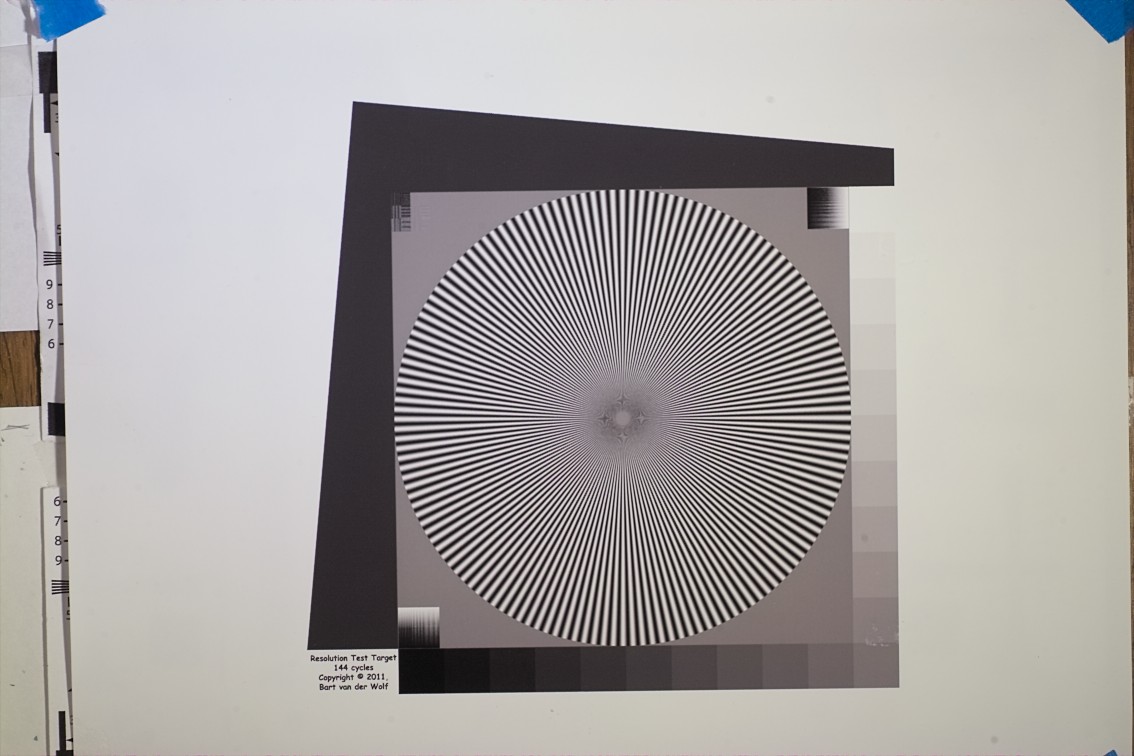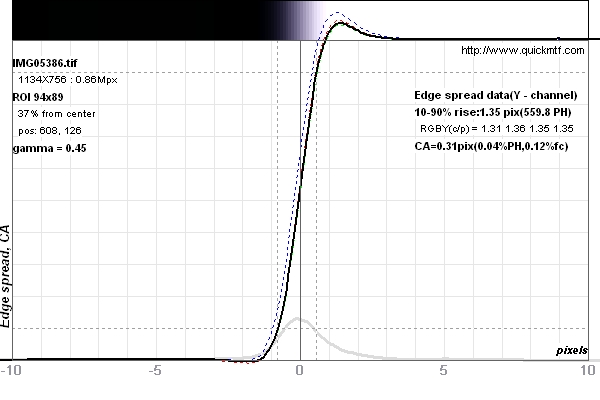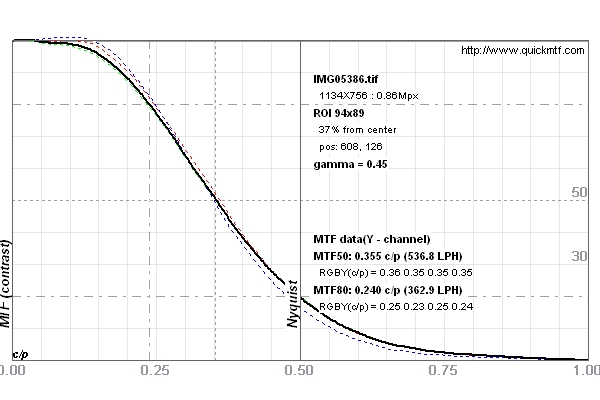The more I think about this, the more I think my original question is a good one with practical consequences.
From what I have observed and what I have read, it seems that for my lens/camera combination the answer is that the lens is the limitation factor but only by a small amount. If that is really the answer, then one consequence of this is that for me to get better reach with a long lens there is no point putting that lens on a smaller format camera rather than full frame. For example, if I changed from the Canon 5d with 22 MP to a 7d with 18 MP with the same lens (or even to the next version of the 7d which is rumoured to have 24 MP) I would not get a better picture than I would get by blowing up the one from the 5d, even though the pixel pitch on the sensor of the 7d is slightly smaller.
Results 41 to 53 of 53
-
18th September 2013, 08:26 AM #41

- Join Date
- Nov 2011
- Location
- Brisbane, Australia
- Posts
- 1,107
- Real Name
- Tony Watts
Re: Does the lens or sensor limit the resolution of an image?
-
18th September 2013, 05:00 PM #42
Re: Does the lens or sensor limit the resolution of an image?
This is achieved through taking six exposures while shuffling the sensor, four exposures with a full pixel shuffle and two with half pixel shuffles, the results are combined to produce a 200Mpixel image (that's a 1.2Gb RAW file or 800Mb TIFF so you really want be shooting tethered). So yes there are more photons captured per photo site but only by virtue of combining multiple exposures. The results are stunning but you can of course only take shots of static subjects and only from a very stable platform.
The only guy I know who uses one of these has a scaffold tower (it's not traditional builders scaffold but it's not that different) which is stabilised with additional weights (sandbags) to which he bolts his Hasselblads, apparently using even the best of traditional tripods apparently doesn't cut it.
We may be getting into semantic differences here but the number of pixels recorded is not a measure of the resolution of an image; so this statement only holds true if the optical resolution of the lens (the capability of the lens in rendering the smallest separation distinguishable) is equal to or higher than the sensor resolution, i.e. the lens is capable of resolving equal or finer detail than the sensor is capable of recording.
Try telling the owner of a shiny new Hasselblad H4D-60 who's just had to replace all their glass for the latest generation of H series lenses that their old lenses weren't limiting the resolution of the images they captured.
Cheers,
Ady
-
19th September 2013, 10:15 AM #43

- Join Date
- May 2012
- Location
- Johannesburg South Africa
- Posts
- 2,547
- Real Name
- Andre Burger
Re: Does the lens or sensor limit the resolution of an image?
Hi Ady,
You are talking about optical resolution and not image resolution. Optical resolution = the ability of an imaging system to resolve detail. As I understand it, optical resolution will determine acutance.
Advancing from 40MB sensor to a 60MB sensor will demand from the lens to “pack” photons with greater accuracy into photosites. A lens designed for a 40MB sensor will “pack” photons into the wrong photosites, causing less acutance. Less acutance will lead to “unsharp” images but not necessarily to lower resolution images. High acutance with low resolution will make an image appear “grainy, noisy, pixilated”. To have a very sharp image you need both high resolution and high acutance. A 60MB sensor does render higher resolution images than a 40MB sensor.
Hasselblad make lenses to suit the sensors fitted to their cameras, pretty much like Nissan matches gearboxes and engines of each GTR. So, your Hasselblad owners, replacing their lenses with latest series H lenses, did not do so to improve resolution, they got that when they upgraded from 40 to 60MB, they did so to improve acutance.
-
19th September 2013, 11:08 AM #44
Re: Does the lens or sensor limit the resolution of an image?
Andre I think "directs" would be a better term than "packs". Light simultaneously behaves as a wave and discrete packets of energy (photons) but I understand the properties of it as a light wave is used in understanding it's behaviour through optical materials (lenses) but as a photon when the energy is absorbed in a crystal structure (silver halide film or silicon sensor). My quantum physics is very old and rusty (now Planck is an incorrectly spelt bit of timber) but I think my memory serves me correctly this time.
Last edited by pnodrog; 19th September 2013 at 11:20 AM.
-
19th September 2013, 11:37 AM #45
Re: Does the lens or sensor limit the resolution of an image?
Hi Andre,
as I said I think we are starting to get into sematic differences here and effectively just disagreeing about the terminology used.
The conventional definition of resolution (when related to imaging) is not about the number of pixels in on a sensor or represented within a file. Resolution is and has been a measure of the level of detail discernable in an image or view since the early 1800s, the term was originally used to describe the level of observable detail through telescopes, way before digital sensors arrived on the scene.
The last time I looked neither International ISO or US ANSI standards organisations accepted the use of resolution to describe the number of pixels recorded as it is potentially misleading in terms of describing the effective resolution (detail resolved) in the resulting image. This may have changed recently, to be honest I've not checked in the last year or two. The fact that resolution has been effectively misused to describe the number of pixels present on a sensor or represented in a file has resulted in terms such as 'optical resolution' being coined to distinguish the resolution of an image from the numbers of pixels.
Of course I'm happy to accept that I'm something of a pedant, and a pedant with no formal education to speak of. So anything I'm unsure about I tend to inform myself through sources such as the OED or ISO documentation (I tend not to trust anything I read on the internet unless it's been verified by an established body). The only drawback is that the language used by such formal entities can fall somewhat behind contemporary use, leading to disagreements that ultimately are about semantics rather than substance.
Cheers,
Ady
-
19th September 2013, 07:16 PM #46

- Join Date
- Feb 2012
- Location
- Texas
- Posts
- 6,956
- Real Name
- Ted
Re: Does the lens or sensor limit the resolution of an image?
As Crocodile Dundee might have said: "Sharp? Call that sharp, mate? . . "Less acutance will lead to “unsharp” images but not necessarily to lower resolution images. High acutance with low resolution will make an image appear “grainy, noisy, pixilated”. To have a very sharp image you need both high resolution and high acutance. A 60MB sensor does render higher resolution images than a 40MB sensor.
Now this is sharp:

Don't think so?

And how about this for detail resolution:

The image is at 100% (no resampling, no post-processing) from an SD9 in low-res pixel-binning mode 1134x756px, that is 0.86MP.
I challenge anyone to post a similar image, say 6MP and up, (100% crop, no post processing) that is "better" than the above. Better than an edge response of 1.35 pixels for 10-90% contrast. Better than 0.355 cy/px for 50% MTF. Better than 20% MTF at Nyquist (please don't play the 'moire' card, I'm just talking about sharpness).
For real-worlders, I will be happy to take a shot of trees at 50 paces and compare with yours (100% crops, remember).
Astute readers will know why my results are so "good" . . .Last edited by xpatUSA; 19th September 2013 at 07:26 PM.
-
19th September 2013, 08:01 PM #47

- Join Date
- Dec 2008
- Location
- New Zealand
- Posts
- 17,660
- Real Name
- Have a guess :)
Re: Does the lens or sensor limit the resolution of an image?
Softness is introduced by 3 things:
- The AA filter
- The digitisation process (ie breaking up an analog scene into a digital representation of that scene), and
- The demosaicing of that digital representation (ie turning 3 monochromatic images back into a full colour representation).
Capture sharpening will make a difference, but has to be the right amounts - generally 0.3px @ 300%
With a quality lens, I suspect that it's the AA filter that'll limit things the most but - in my opinion - it's a moot point when we only use around 5% of the data we capture anyway (in the vast majority of cases).
-
19th September 2013, 09:06 PM #48
Re: Does the lens or sensor limit the resolution of an image?
for what it's worth I wouldn't remove any aa filter as the moire problem is bigger and harder to fix than he sharpening I've found. Came close to whipping out the aa on my old bridge camera too when I took hot mirror out (and stuck 780nm filter on) but decided real world I'd rather live with the softening.
-
19th September 2013, 09:59 PM #49

- Join Date
- Feb 2012
- Location
- Texas
- Posts
- 6,956
- Real Name
- Ted
-
19th September 2013, 11:26 PM #50

- Join Date
- Dec 2008
- Location
- New Zealand
- Posts
- 17,660
- Real Name
- Have a guess :)
Re: Does the lens or sensor limit the resolution of an image?
Most images we capture at around 18MP these days - and most images we display are around 1MP; sure, other factors enter into it - and there are exceptions - , but the bottom line for me is that far too many photographers lose sight of the forest whilst obsessing over the texture of the bark. They obsess that camera "A" is better than camera "B" because of some irrelevant metric and then proceed to completely ignore factors that impact the image quality 1000 fold more (such as composition, exposure, sharpening, colour correction & white balancing).
It's like polishing the hub caps of your car to make it more fuel efficient, but leaving your boat attached to the tow bar when you're not going out boating - and then debating which polish is better rather than how to remove the boat.
If folks want to take better photos then they need to be learning better skills and educating themselves more, not getting down to microscopic specifications. Hence the reason they say "a pro could produce something good enough to hang on a gallery wall using only a camera phone".
-
19th September 2013, 11:41 PM #51
Re: Does the lens or sensor limit the resolution of an image?
One of the reasons I always enjoyed DRTV's pro camera challenge as it kind of proves that point. I can honestly say whenever I think my camera may be limiting me from better photos (an idea sold by marketing it seems) and hand my 1100D to long time pro photographer friends it becomes apparent I am DEFINATELY the one affecting image quality the most, for the worst.
-
20th September 2013, 12:02 AM #52

- Join Date
- Dec 2008
- Location
- New Zealand
- Posts
- 17,660
- Real Name
- Have a guess :)
Re: Does the lens or sensor limit the resolution of an image?
I always say that it's not "one over the other" - both the camera and the photographer contribute to the deviation between the theoretically perfect photo and the ones that they're actually getting - but the ratio of the two varies wildly depending on a number of variables. The camera's technology can compensate a "little" but the gain is disproportionate to the cost; in approx 100% of cases folks would be better off not spending $$$ on Camera A to solve a problem -- instead, invest 1/10th that amount in education and other equipment (eg post-processing gear, lights, tripods, reflectors etc).
Don't get me wrong - if someone just wants a new camera for the hell of it then go for it (I did with the 1Dx), but they shouldn't expect it to improve their photography in the vast majority of cases.
-
20th September 2013, 04:44 AM #53

- Join Date
- Feb 2012
- Location
- Texas
- Posts
- 6,956
- Real Name
- Ted

 Helpful Posts:
Helpful Posts: 
 Reply With Quote
Reply With Quote


